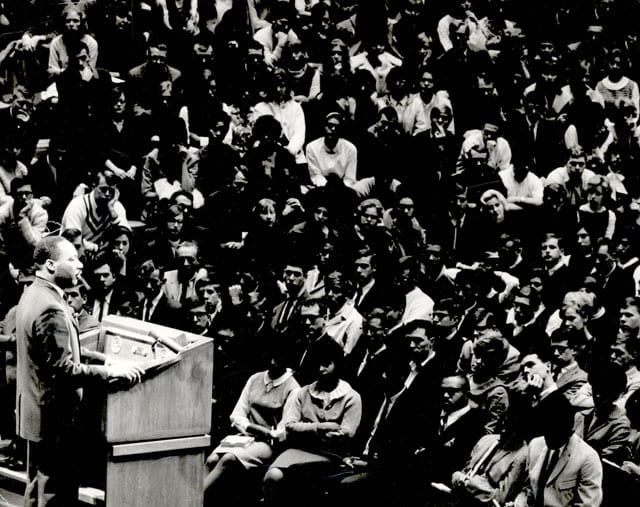Each year, on Dr. Martin Luther King Jr.’s birthday, I honor his legacy by reflecting on our progress in becoming more diverse, equitable and inclusive.
Many Penn Staters have personal memories of Dr. King. Some may have attended his speech in Rec Hall in 1965. Some of our students attended a school named in his honor, or were inspired by Dr. King to participate in an annual day of service. My own relationship with Dr. King’s teachings was formed growing up in the segregated South. I saw firsthand the inequities that spanned water fountains, restaurants, hotels, restrooms, voting, housing and schools. The isolation and abuse that a lone Black student felt in my large high school are powerful memories that I will never forget. There was also hope. As an Atlanta high school student walking in Dr. King’s funeral procession, I saw tens of thousands of people send the message that King’s voice was not going to be silenced by an assassin’s bullet. I watched as the highest court of the land consistently struck down segregation.
In this context, we have come a long way as a nation. Gone are the ignorant “whites only” signs and most Jim Crow laws. I can also mark the progress at Penn State, but I can do so only if it is followed by an honest accounting of the level of disenfranchisement that continues today. A wise Penn State Forum on Black Affairs (FOBA) leader once told me that if we spend our time taking pride in what we have done, we will lose sight of how far we must go.
So, first a few examples of progress.
When Dr. King visited Penn State in 1965, of the 21,000 students attending Penn State, only about 300 were African American. The years since then have seen slow but significant change. Penn State is now more diverse, with 21% of our students identifying as part of underrepresented groups; and women comprising nearly half of the undergraduate population. This academic year, we welcomed one of the largest underrepresented groups in University history.
Over the last two years, thousands of Penn Staters have participated in discussions on racial justice, and many in our community have responded by contributing to the work needed to make real and lasting change, including 6,000 employees and students who participated in panels focused on diversity, equity and inclusion at an enterprise scale. In particular, our students have worked to send a public message of inclusivity.
Importantly, Penn State has launched a national search to hire a director to establish the new Center for Racial Justice. Housed within the Social Science Research Institute (SSRI), it will advance the recommendations of the Select Penn State Presidential Commission on Racism, Bias, and Community Safety. Most importantly, the Center will bring the power of our scholarship to address critical human and social problems centered on race.
But now, more than 50 years later, we must still take perspective from Dr. King himself, who said in his Rec Hall speech, “We have come a long, long way in the struggle for racial justice, but we have a long, long way to go before the problem is solved.”
Whereas, we can point to a community of students that is more diverse, we cannot point to the diversity of our faculty. And, welcoming our most diverse class of students is not the same as retaining and graduating them at the same rate.
We can point to our employees and students who participate in events that celebrate diversity and who are actively working to promote inclusivity, but our community also faces more overt expressions of racism today than it did a decade ago. We cannot avoid the fact that mothers of Black sons have a deep worry about their safety even when exercising simple tasks like going to a store.
We can point to the power of our scholarship if we use our resources to develop a nationally recognized Center for Racial Justice, but the growing pressure to limit what we study and what we teach is profoundly disturbing.
We have many challenges to overcome before we can achieve racial justice in society and within higher education. I try to remain hopeful, and I know we must remain focused. I hope we can take note of what we have accomplished together but know that we must continue with passion and purpose.
On Dr. King’s birthday, I urge you to take a few moments to reflect on your role in creating a just community and world. Use your talents wisely and raise your voice for those who go unheard.
Thank you for being part of Penn State, and thank you for helping to make our community a more welcoming and inclusive place for everyone.
Note: In the video below, Forum on Black Affairs President André Culbreath is joined by President Barron, FOBA Past President Leslie Laing, and State College and Centre Region NAACP President Lorraine Jones to celebrate and reflect on the legacy and teachings of Dr. Martin Luther King Jr. The message marks FOBA’s 47th annual commemoration of Dr. King’s life, shared virtually this year in light of the pandemic. The participants also celebrate the legacy and many contributions of FOBA Past President Alan T. Payne, and announce the recipients of the 2022 Fannie Lou Hamer and W.E.B. DuBois Service Scholarship award.





